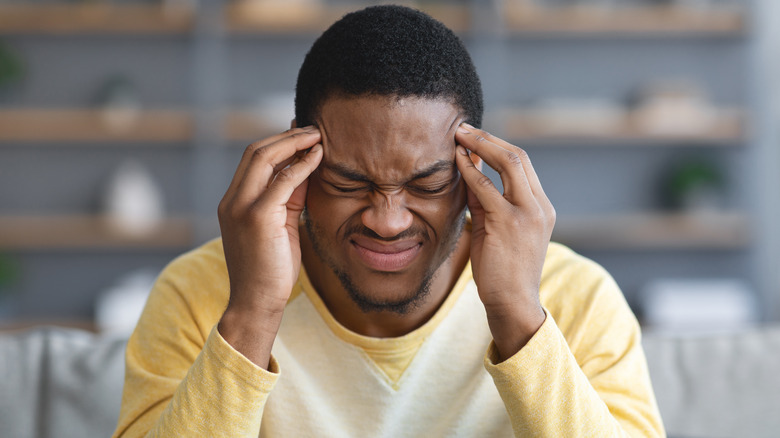This Is What Really Causes Cluster Headaches
A cluster headache is an extremely painful type of headache that typically occurs behind one eye. In many cases, the pain can even wake you up during the night, Mayo Clinic reports. A cluster headache is triggered by the expansion of blood vessels, which puts pressure on the fifth cranial nerve, known as the trigeminal nerve. The blood vessels give blood from your brain to your face, so when they expand or dilate, you'll likely feel sensations in your face and brain, according to Healthline. However, why blood vessels expand is still unknown.
Some researchers believe abnormalities in a part of the brain known as the hypothalamus, which controls certain body functions, such as body temperature, hormones, and appetite, are to blame for cluster headaches. There's also the possibility that two chemicals (histamine and serotonin) are responsible. Histamine helps your body tackle allergies and infections, while serotonin modulates your mood.
Symptoms of cluster headaches
Cluster headaches have nearly a dozen symptoms, with the most common ones being pain behind one eye, redness near the affected eye, and excessive tearing. It's also possible to experience your eyelids drooping, sweating on your face, and restlessness. Cluster headaches and migraines can be tough to diagnose because they have similar symptoms. However, according to Mayo Clinic, cluster headaches and migraines can be told apart. For those who suffer from cluster headaches, you may find yourself pacing more than usual. When a migraine occurs, there's more sensitivity to light. Because some cluster headache symptoms are similar to other symptoms of serious medical conditions, such as a stroke, you should contact your doctor to inform them of your pain.
While there's no cure for cluster headaches, doctors can provide you with some relief in the meantime. Relief from cluster headaches may come in the form of medication, nasal spray, steroids, or oxygen. Johns Hopkins Medicine reports taking medication daily can help prevent attacks. Cluster headaches can easily disrupt one's lifestyle and mood, but there's no sign they cause any permanent damage to your brain.


